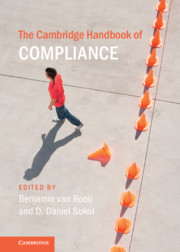Book contents
- The Cambridge Handbook of Compliance
- The Cambridge Handbook of Compliance
- Copyright page
- Contents
- Figures
- Tables
- Contributors
- 1 Introduction: Compliance as the Interaction between Rules and Behavior
- Part I Compliance Concepts and Approaches
- 2 Compliance as Costs and Benefits
- 3 The Professionalization of Compliance
- 4 From Responsive Regulation to Ecological Compliance: Meta-regulation and the Existential Challenge of Corporate Compliance
- 5 Behavioral Ethics as Compliance
- 6 Constructing the Content and Meaning of Law and Compliance
- 7 Compliance as Operations Management
- 8 Compliance and Contestation
- 9 Compliance as Management
- 10 Compliance as Liability Risk Management
- 11 Criminalized Compliance
- 12 Supply Chain Compliance
- 13 Regulatory Compliance in a Global Perspective: Developing Countries, Emerging Markets and the Role of International Development Institutions
- Part II Deterrence and Incapacitation
- Part III Incentives
- Part IV Legitimacy and Social Norms
- Part V Capacity and Opportunity
- Part VI Compliance and Cognition
- Part VII Management and Organizational Processes
- Part VIII Measuring and Evaluating Compliance
- Part IX Analysis of Particular Fields
- References
13 - Regulatory Compliance in a Global Perspective: Developing Countries, Emerging Markets and the Role of International Development Institutions
from Part I - Compliance Concepts and Approaches
Published online by Cambridge University Press: 07 May 2021
- The Cambridge Handbook of Compliance
- The Cambridge Handbook of Compliance
- Copyright page
- Contents
- Figures
- Tables
- Contributors
- 1 Introduction: Compliance as the Interaction between Rules and Behavior
- Part I Compliance Concepts and Approaches
- 2 Compliance as Costs and Benefits
- 3 The Professionalization of Compliance
- 4 From Responsive Regulation to Ecological Compliance: Meta-regulation and the Existential Challenge of Corporate Compliance
- 5 Behavioral Ethics as Compliance
- 6 Constructing the Content and Meaning of Law and Compliance
- 7 Compliance as Operations Management
- 8 Compliance and Contestation
- 9 Compliance as Management
- 10 Compliance as Liability Risk Management
- 11 Criminalized Compliance
- 12 Supply Chain Compliance
- 13 Regulatory Compliance in a Global Perspective: Developing Countries, Emerging Markets and the Role of International Development Institutions
- Part II Deterrence and Incapacitation
- Part III Incentives
- Part IV Legitimacy and Social Norms
- Part V Capacity and Opportunity
- Part VI Compliance and Cognition
- Part VII Management and Organizational Processes
- Part VIII Measuring and Evaluating Compliance
- Part IX Analysis of Particular Fields
- References
Summary
Abstract: Regulatory compliance is crucial to ensure that regulation and related public policies achieve their intended public outcomes – that is, safeguarding key elements of public welfare in a given country, while supporting economic and social development. Although this often remains implicit, promoting regulatory compliance is an important aspect of international development work. Nonetheless, the need to treat “compliance” or behavior change as a specific object has taken time to emerge, as has the understanding of the entire process between inputs (regulations, resources) and outcome (compliance or behavior change, or the absence thereof). Research shows that compliance is not an automatic consequence of regulations, that it does not always produce the desired outcomes, and that the “volume” and severity of enforcement do not necessarily correlate with compliance and regulatory outcomes. Significant evidence also suggests that poorly designed regulation, regulatory administration, procedures and systems can be both a hindrance to economic growth and a source of corruption.
This chapter looks at the specific aspects and challenges of regulatory compliance in a broad “development” context – characterized by a vast informal sector or significant “gray economy,” regulatory burden and barriers, and overall insufficient regulatory compliance (and thus effectiveness). In this context, “regulatory delivery” – that is, how the whole range of state activities aiming at improving or securing compliance is designed, structured, resourced and implemented – particularly matters. A more risk-based, focused, responsive regulatory delivery helps to maintain institutional integrity while taking into account actual issues and demands and can also support good governance and the rule of law.
- Type
- Chapter
- Information
- The Cambridge Handbook of Compliance , pp. 158 - 176Publisher: Cambridge University PressPrint publication year: 2021



